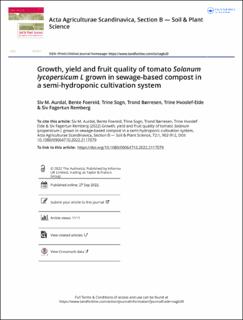Growth, yield and fruit quality of tomato Solanum lycopersicum L grown in sewage-based compost in a semi-hydroponic cultivation system
Aurdal, Siv Mari; Føreid, Bente; Sogn, Trine Aulstad; Børresen, Trond; Hvoslef-Eide, Trine; Remberg, Siv Fagertun
Peer reviewed, Journal article
Published version
Permanent lenke
https://hdl.handle.net/11250/3059260Utgivelsesdato
2022-09-27Metadata
Vis full innførselSamlinger
Originalversjon
Acta Agriculturæ Scandinavica - Section B, Soil and Plant Science. 2022, 72 (1), 902-912. 10.1080/09064710.2022.2117079Sammendrag
Purpose: Due to environmental concerns, there is a demand to reduce the use of peat as a growing medium for horticultural crops. Simultaneously, there is an interest to recycle organic waste materials in the form of compost. This study aimed to document effects on growth, yield, and fruit quality of tomato plants when cultivated in a sewage digestate-based compost in a subirrigation container system. Materials and methods: The compost used in this experiment consisted of 30% hygienised sewage digestate from biogas extraction and 70% garden waste. The treatments were 100% compost, a peat mix and mixtures of the two in 25/75, 50/50 and 75/25 ratios. Results and conclusion: Considering the contrast in chemical and physical properties of the treatments, variations in growth, yield and quality were expected. The plants differed in leaf area and number of leaves, but there were no differences in yield or quality of the tomato fruits. It is assumed that this is in great part due to the remediating effects of subirrigation with an ideal nutrient solution, and the use of pre-established plants. Further research should focus on benefits of this cultivation system for use in sustainable horticulture in combination with recycled organic waste.

